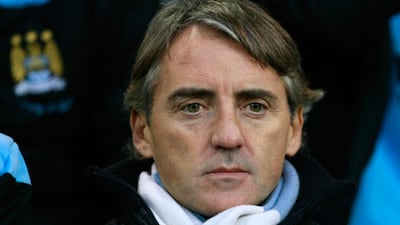Roberto Mancini will have foreseen long ago that these were the two months when Manchester City might run short of a bit of steel: Yaya Toure was always scheduled to be absent from their midfield while at the African Nations Cup for much of January and February.
Less predictable was how one goalless draw would set so many to wonder whether City were going to run out of steam.
Being held by West Bromwich Albion, as City were on their last outing of 2011, is no embarrassment.
But coupled with an emphatic Manchester United win the same day and the tight pairing of the two Manchester clubs at the summit of the Premier League, it is assumed that the Italian manager, younger and newer to English football than his counterpart at United, will have his capacity to keep his nerve thoroughly examined in the run-in to the title.
Sir Alex Ferguson does not master the table every single spring; but he is masterful at reminding opponents that United have a useful habit of gaining in strength in the second halves of campaigns.
At some point, Ferguson may chose to remind Mancini that, in the past, that has not been true of the City manager.
Mancini will expect mind games of that sort. When he first became a head coach, in Serie A just over a decade ago, another wily, experienced adversary immediately identified himself as a crafty psychological dueller.
Fabio Capello, then the head coach of Roma - soon to become Italian champions - criticised the young Mancini's appointment at Fiorentina on the grounds Mancini had not sat sufficient training courses for such a promotion.
Once Mancini took over at Lazio, Roma's local rivals, the rivalry intensified. Rome then had a bit of the character of Manchester now - a veteran in charge of the reds; an initiate at the sky-blues - although theirs was seldom a duel for the championship. Capello versus Mancini only resembled that when the senior man joined Juventus and Mancini went to Inter Milan.
In his first season at Inter, Mancini started slowly, but gathered authority and his team gained confidence. They would finish third, trailing Juventus, the "champions" - because of the Calciopoli affair, Juve were later stripped of the prize - by 14 points, but in the second half of the campaign Inter almost matched the pacesetters, gaining only one point less than Juve over the last 19 matches.
In 2005/06, the next season - another campaign blemished subsequently by investigations into manipulation of referees - would follow a contrary course. Inter faded after January, having begun the season as sturdier challengers.
So emphatic was Inter's first championship win in 2007, their first since the 1980s and the prize that launched Mancini's stellar reputation, that close analysis of dips in form should be taken with a warning: Any team that wins a league with a margin of 22 points over the second-placed finisher, as Inter did over Roma, is bound to ease up towards the end.
It is what happened the next season that shines a curious light on Mancini's adeptness at handling the pressure of a tight race for the finish line.
In 2007/08, Inter had set off from the front defending their Serie A crown. Then they lost form. Roma and Milan meanwhile gathered momentum. When Inter drew with Roma and lost to Napoli in successive matches going into March, they became jittery, as Zlatan Ibrahimovic, then Inter's spearhead striker, recalled. "I heard Mancini and the other coaches talking: They were worried. The nervousness had spread through the squad and confidence had disappeared.
"From having been a winning machine, we now didn't even feel confident against the bottom teams."
Inter then exited the Champions League, against Liverpool, a familiar disappointment in a competition in which Mancini's record as a coach is very ordinary.
In the context of the Italian championship-chase, his reaction would be damaging. Mancini appeared to announce his resignation; then he changed his mind.
"The atmosphere in the team was awful," remembers Ibrahimovic, whose own injury problems had not helped during the period. "It was like a switch had been flicked. The harmony and optimism had gone. The media attacked Inter's problems, and when Mancini declared he would leave, then he took it back, the trust in him disappeared.
"As a coach you can't do that. It isn't professional. And we kept losing points. Our big advantage in the league decreased all the time."
Pressure stacked onto Inter, right up the season's final day. They led Roma, who were away at Catania, by a point going into their final fixture at Parma. Roma took an early lead.
By half-time at Parma, Inter were still being held 0-0. That would have left Roma champions. The atmosphere in the dressing-room? "Horrible," recalled Ibrahimovic, "catastrophic, and the players got more and more tense."
Enter Ibrahimovic, a second-half substitute. He scored twice to seal the league title. It had been alarmingly close. But Mancini had his victorious parting gift for and from Inter, along with a few lessons learnt about how not to respond to the pressure of expectation.


